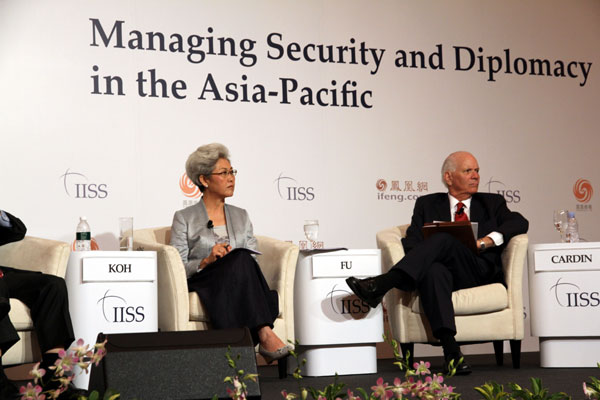 |
|
Fu Ying (L), chairperson of the Foreign Affairs Committee of China's National People's Congress, attends the 13th Asia Security Summit, or Shangri-La Dialogue in Singapore, May 30, 2014. [Photo by Zhao Shengnan / chinadaily.com.cn] |
Over the past 20 years, the Asia-Pacific region has seen the largest poverty alleviation and fast economic growth in the world, due to sustained stability and peace, Fu said when attending the 13th Asia Security Summit, or Shangri-La Dialogue.
Fu said in order to tackle the regional security challenges and for a better development, closer and greater cooperation are needed.
She said the Asia-Pacific region currently stands at the doorstep of choices.
It is time to reflect on whether to continue the path of building trust, having cooperation and resolving differences that have been proven correct in the past decade, or to enlarge the differences.
Chinese President Xi Jinping recently said at the fourth summit of the Conference on Interaction and Confidence Building Measures in Asia summit that China would like to see a new security approach in Asia focusing on cooperation, coordination and sustainability.
Xi emphasized the importance of candid dialogues and peaceful means in addressing challenges confronted China.
Fu said China is faced with difficult challenges such as the incident that Japan's government nationalized Diaoyu Islands.
China has to respond effectively to protect China's interest and prevent provocation from escalating clashes as well.
"That's important for preserving peace and stability as well. But in the final analysis, it's very important to come back to dialogue, negotiations and consensus that we are trying to resolve the issues through peaceful means," Fu said.
She expressed her concern that Japan's Prime Minister Shinzo Abe is "making Diaoyu Islands a bigger issue" and tried to convey the message to the world that China had posed a threat to Japan, using that as an excuse to amend the security policy of Japan.
On China-ASEAN relations, Tommy Koh, Chairperson on the High- Level Task Force on the Drafting of the ASEAN Charter who also attended the activity, said ASEAN's mission and agenda is to promote peace, cooperation and mutual trust in the Asia-Pacific region.
He noted that ASEAN needs to play a positive role in increasing trust of the region, given that both the phenomena of high-degree of cooperation and deficit of trust coexist in the region.
Koh believe that the ASEAN-China relation is mutually beneficial and develops in a positive direction.
"Do we have a deficit or do we have a newly created mistrust? It's a question we need to reflect on. But it's important that all the leaders in the region are duty-bound to continue build the trust," Fu responded to Koh in this way.
The Shangri-La Dialogue, a multilateral forum organized by the London-based think tank International Institute for Strategic Studies, has been one of the key events for defense professionals in the region to exchange views on security issues.
Wang Guanzhong, deputy chief of general staff of the Chinese People's Liberation Army (PLA), leads the Chinese delegation to the dialogue this year.
The Chinese delegation will expound China's point of view on security during the dialogue and discuss with other parties on ways to jointly safeguard regional peace, security and stability.
